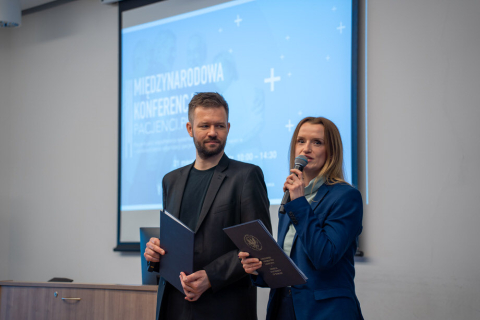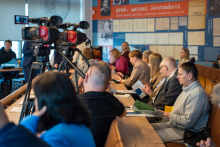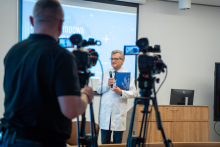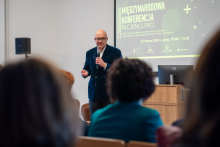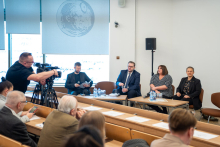The meeting was titled: "The patient as a co-creator of the health care system - experiences of patient organizations in Poland and around the world." The meeting was moderated by Magdalena Romanowicz, coordinator of the PACJENCI.PRO project on the part of the Union of Innovative Employers INFARMA, and Dominik Olejniczak, MD, PhD, coordinator of the PACJENCI.PRO project on the part of the Faculty of Health Sciences MUW.
Why patients should co-create the system
Prof. Zbigniew Gaciong, Rector of MUW, spoke at the beginning of the conference. Stressing the importance of patient organizations, he gave an example of their achievements in the case of rare diseases.
- Recently, a conference on rare diseases was held at our university. On the margins of the meeting, I had the opportunity to have many conversations with people who are active in patient organizations dealing with these diseases. These are mostly parents of sick children. I am very impressed by what they are doing - the Rector said.
Whereas, Prof. Mariusz Gujski, Dean of the Faculty of Health Sciences MUW, stressed that, unfortunately, we have been rather late in recognizing the role of patient organizations in the health care system in Poland.
- We all know what user experience means. So it is somewhat of an intellectual aberration not to invite patients to co-create the health care system. After all, this system is designed for patients. We doctors have already mostly cured ourselves of paternalism and have been treating patients as partners for years - Prof. Gujski said.
And he added that the initiative behind the conference is very important and has sense when followed by the next steps. And those steps are to work together with the National Health Fund, the Ministry of Health and the Patient Ombudsman to strengthen the role of patients.
Engagement barometer – results of the surveys
During the conference, the results of the survey entitled: “Patients' organizations engagement barometer in the processes of shaping the health care system in Poland in 2022-2023” were presented by Anna Skoczylas Ligocka, representative of patients' organizations, advisor to the Patients Organizations Development Academy Patients.Pro.
The survey was conducted on a group of 100 representatives of patient organizations. It shows that patient organizations are interested in cooperation with central offices. As many as 70 percent of the organizations indicated that they have engaged in cooperation with at least one central institution. The highest number of indications concerned the Office of the Patient Ombudsman and the Ministry of Health. In contrast, those who have not undertaken such cooperation are interested in it.
Those who cooperate were asked the question - how is it going? Are comments, suggestions proposals taken into account by central offices? 26 percent of respondents answered that they are taken into account. 34 percent - that they are not.
-This may not be a very optimistic result - commented Anna Skoczylas Ligocka - but still better than the previous corresponding barometer, when the percentage of negative responses was 49 percent. So there is progress.
Among the barriers that patient organizations face in cooperating with institutions, the most frequently mentioned were problems in conducting dialogue, i.e. lack of response to correspondence, lack of opportunity to meet.
Comments from officials and representatives of organizations
The results of the study were first addressed by representatives of public administration: Office of the Patient Ombudsman, Medical Research Agency, Agency for Health Technology Assessment and Tarification, Ministry of Health. All stressed that they were open to cooperation with patient organizations. At the same time, they encouraged people to follow the websites of their institutions, check the announcements of consultations and apply for participation.
Then the representatives of patient foundations and associations spoke, both those with extensive experience (e.g., Urszula Jaworska Foundation) and those that have been "on the market" for only a few years (Epi Bohater Foundation). A recurring idea in the discussion was that if organizations want to be a partner for public administration institutions - they must act professionally and substantively. They also need to be more proactive.
- Let's not wait for invitations, because no one will invite us, let's register for important events ourselves - said Urszula Jaworska.
The conference also featured speeches by the representatives of patient organizations from abroad - Greece, the Czech Republic and Hungary. They spoke about what they focus their activities on and what opportunities they have.
Umbrella organizations and the voice of doctors
The panel with representatives of umbrella organizations was also very interesting. They told how much can be gained by interacting with European and global foundations. This is mainly about participation in international conferences, knowledge exchange and joint projects.
In contrast, the final discussion focused on how patient organizations can support clinicians in disseminating up-to-date medical knowledge to patients and in implementing global standards. The talk was primarily about preventive measures. Experts stressed that the websites of foundations and associations should be a source of reliable content created in cooperation with doctors. It is there that patients should look for information, and not ask "Dr. Google" for advice.
The conference was held under the honorary patronage of Bartłomiej Łukasz Chmielowiec, Ombudsman for Patients' Rights, Prof. Zbigniew Gaciong, Rector of MUW, Prof. Mariusz Gujski Dean of the Faculty of Health Sciences MUW.
Guests of the conference
Guests at the Conference included: Michał Byliniak, General Director of the Union of Employers of Innovative Pharmaceutical Companies INFARMA; Jakub Gołąb, Director of the Department of Cooperation at the Office of the Patient Ombudsman; Dr. Elżbieta Bylina, Deputy Director of the Clinical Trials Development Centre at the Medical Research Agency; Joanna Parkitna, Director of the Department of Health Technology Assessment at the Agency for Health Technology Assessment and Tarification; Joanna Poźniak, Counselor at the Department of Social Dialogue at the Ministry of Health, Urszula Jaworska, president of the Urszula Jaworska Foundation; Lucyna Jaworska-Wojtas, president of the Overcome Endometriosis Foundation; Monika Kaczmarek, president of the Board of Directors of the Polish Diabetes Association; Alicja Lisowska, president of the Epi-Bohater Foundation, Violetta Zajk, president of the 3majmy się Razem Association, Vasiliki Rafaela Vakouftsi, president of the Greek Patients’ Association (Greece); Jana Pelouchova, president of the Leukemia Patient Advocates Foundation (Czech Republic); Janka Kocsis, European Industrial Pharmacists Group (Hungary), Igor Grzesiak, vice president of the Board of Directors of the Institute for Patients' Rights and Health Education; Marzena Nelken, director of the National Orphan Forum; Grzegorz Perzyński, president of the LIVERstrong Transplantation Foundation, International Network for Innumonecompetent Patients (IIAN), Iga Rawicka, president of the EuropaColon Poland Foundation; Łukasz Rokicki, president of the Wieslawa Adamiec CARITA Foundation, Dr. Piotr Dąbrowiecki, Department of Internal Medicine, Infectious Diseases and Allergology of the Military Medical Institute in Warsaw, Chairman of the Polish Federation of Associations of Asthma, Allergy and COPD Patients; Prof. Robert J. Gil, President of the Polish Society of Cardiology; Prof. Piotr Rutkowski, President of the Polish Society of Oncology; Dorota Korycińska, President of the Board of Directors of the National Federation of Oncology and the Neurofibromatosis Association Poland; Agnieszka Wołczenko, President of the National Association of Patients with Heart and Vascular Diseases EcoSerce.
The event was organized within the framework of the Patients Organizations Development Academy PATIENTS.PRO project, carried out in cooperation between the Faculty of Health Sciences MUW and the Employers' Union of Innovative Pharmaceutical Companies INFARMA.
